The code section has very detailed comments, basically zero-based can read more, so let's not say much here, just go to the code.Where there are errors or shortcomings, please leave a message below.
Know the dictionary:
# -*- coding: utf-8 -*-
#A python dictionary defines a dictionary that stores attributes, the first one being keys and the last one being values, which need to be used in the middle: separated, used between each attribute, separated
alien = {'color': 'green', 'age': 18}
#Remove the data from the dictionary
print(alien['color'])
#Add key-value pairs
alien['x_pos'] = 0
alien['y_pos'] = 10
print(alien)
#Modify values in the dictionary
alien['color'] = 'red'
print(alien)
#Delete key-value pairs
del alien['color']
print(alien)
#Dictionary traversal, key s and value s are variables that can be freely written
user = {
'username': 'admin',
'first': 'enrico',
'last': 'fermi',
}
for key, value in user.items():
print("\nkey:"+key)
print("value:"+value)
#Traverse all keys in a dictionary
for name in user.keys():
print(name.title())
#A small case of a dictionary
print("Dictionaries and if A small case")
friends = ['first', 'last']
for name in user.keys():
print(name.title())
if name in friends:
print(' key: '+name.title()+" : "+user[name].title())
#sorted() key value ordering
print()
for name in sorted(user.keys()):
print(name)
#Traversing through all values in a dictionary
favorite = {
'jen': 'python',
'sarah': 'c',
'edward': 'python',
}
print()
for language in favorite.values():
print(language.title());
#set() removes duplicate elements
print("set()Remove duplicate elements")
for language in set(favorite.values()):
print(language.title());
Run result:
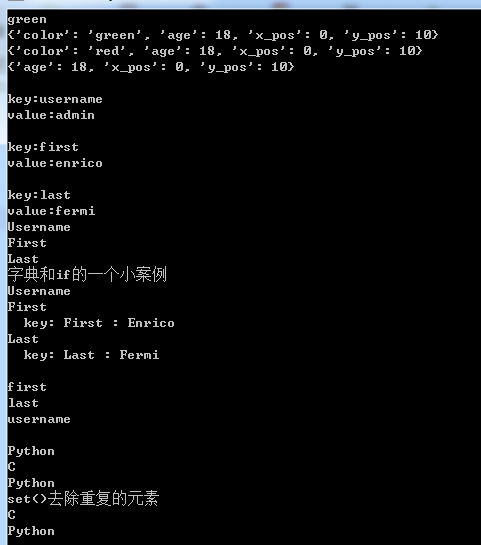
Basic uses of dictionaries:
# -*- coding: utf-8 -*-
#Nested list
alien_0 = {'color': 'green', 'points': 5}
alien_1 = {'color': 'yellow', 'points': 10}
alien_2 = {'color': 'red', 'points': 15}
aliens = [alien_0, alien_1, alien_2]
for alien in aliens:
print(alien)
#A simple little case
#Create an empty list
print("Small Case")
aliens = []
#Create 30 pieces of data
for alien_number in range(0, 30):
new_alien = {'color': 'green', 'points': 5}
aliens.append(new_alien)
for alien in aliens[0: 3]:
if alien['color'] == 'green':
alien['color'] = 'yellow'
alien['speed'] = 'medium'
alien['points'] = 10
for alien in aliens[0: 5]:
print(alien)
#Store lists in a dictionary
print("Store lists in a dictionary")
favorite = {
'jen': ['python', 'ruby'],
'sarah': ['c'],
'edward': ['ruby', 'go'],
'phil': ['python', 'hashell'],
}
#Traversal Output
for name, languages in favorite.items():
print(name.title()+"'s favorite languages are:")
for language in languages:
print('\t'+language.title())
#Store a dictionary in a dictionary
print("Store a dictionary in a dictionary")
users = {
'aeinstenin': {
'first': 'albert',
'last': 'einstein',
'location': 'princeton',
},
'mcurie':{
'first': 'marie',
'last': 'curie',
'location': 'paris',
},
}
for username, user_info in users.items():
print("Username: "+username)
full_name = user_info['first']+" "+user_info['last']
location = user_info['location']
print("\tFull name: "+full_name.title())
print("\tLocation: "+location.title())
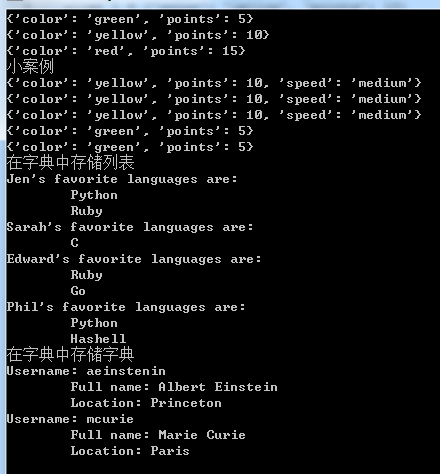
input() Basic usage of user keyboard input function:
# -*- coding: utf-8 -*-
#input() User keyboard input, prompt inside input
message = input("Please enter:")
print(message)
#int() Converts a string number to an int type
age = input("Please enter age:")
if int(age) > 18:
print("adult")
else:
print("Under age")
#% Remainder Operator, Remainder
number = input("Please enter a number:")
if int(number) % 2 == 0:
print(str(number) + "Is Even")
else:
print(str(number)+"is odd")
Run result:
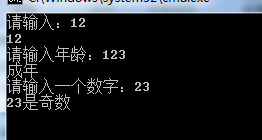
Basic use of while loops:
# -*- coding: utf-8 -*-
#While loop, which executes the code block inside while if the condition after while is satisfied
number = 1
while number <= 5:
print(number)
number += 1
#break exits the loop
while True:
city = input("Please enter a region:")
if city == 'quit':
break;
else:
print(city.title())
#continue ends this cycle
number = 0
while number < 10:
number += 1
if number % 2 == 0:
continue
print(number)
#while Loop Deletes List Elements
pets = ['dog', 'cat', 'dog', 'goldfish', 'cat', 'rabbit', 'cat']
print(pets)
while('cat') in pets:
pets.remove('cat')
print(pets)
#A while loop is used in conjunction with a dictionary to add a dictionary
responses = {}
while True:
name = input("Enter dictionary name:")
response = input("Enter dictionary contents:")
responses[name] = response
repeat = input("Whether to continue typing(yes/no): ")
if repeat == 'no':
break
for nema, response in responses.items():
print("Dictionary name:"+name+", Dictionary contents:"+response)
Run result:
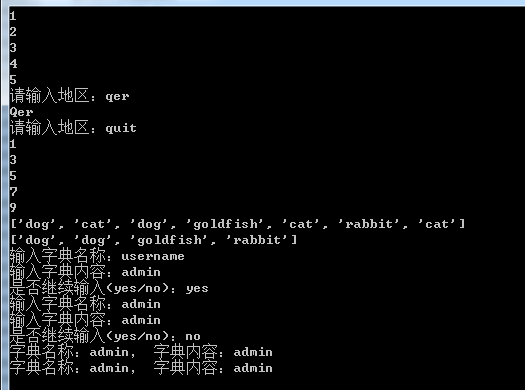
Definition and use of functions (important):
Functions are the equivalent of Java's method of writing some code in a function that can be called repeatedly by name of the function. Let's look at some code below.
# -*- coding: utf-8 -*-
#Definition of function, def function name () defines function, function can be called repeatedly
def greet_user():
"""Notes"""
print("hello")
greet_user()
#A function with parameters, which are called with parameters
def greet_user(username):
print("hello, "+username.title())
greet_user("Zhang San")
greet_user("Li Si")
#Key Arguments
def pet(name, age):
print("name:"+name+", type:"+str(age))
#Key argument, parameter order can be distorted
#The following two are equivalent
pet(name="Zhang San", age=19)
pet(age = 18, name="Li Si")
#Set default values for functions
def describe(name, age=18):
print("name:"+name+", type:"+str(age))
describe(name="Zhang San")
describe("Li Si")
describe("King Five", 16)
describe(name="King Five", age=16)
#Return return value with return value function
def getName(name):
return name
name = getName("Zhang San")
print(name)
#Small Case
def get_formatted(first_name, last_name, middle_name=''):
if middle_name:
return first_name+" "+middle_name+" "+last_name
else:
return first_name+" "+last_name
musician = get_formatted('jimi', 'hendrix')
print(musician)
musician = get_formatted('john', 'hooker', 'lee')
print(musician)Operation effect:
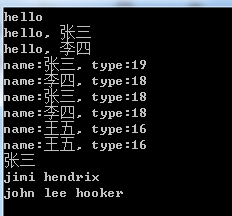
Use of functions:
# -*- coding: utf-8 -*-
#Function Return Dictionary
def build_person(first_name, last_name):
person={'first': first_name, 'last': last_name}
return person
musician = build_person('jimi', 'hendrix')
print(musician)
#Combining functions with while loops
def get_formatted_name(first_name, last_name):
full_name = first_name+" "+last_name
return full_name.title()
while True:
f_name = input("First name(input q Sign out):")
if f_name == 'q':
break;
l_name = input("Last name(input q Sign out):")
if l_name == 'q':
break;
name = get_formatted_name(f_name, l_name)
print(name)
#Pass List to Function
def greet_users(names):
for name in names:
msg = "Hello, "+name.title()+"!"
print(msg)
usernames = ['hannah', 'ty', 'margot']
greet_users(usernames)
#Pass any number of arguments, *toppings, *sign means you need to pass a tuple of toppings
print("Pass any number of arguments")
def make_pizza(*toppings):
print(toppings)
make_pizza('pepperoni')
make_pizza('mushrooms', 'green')Run result:
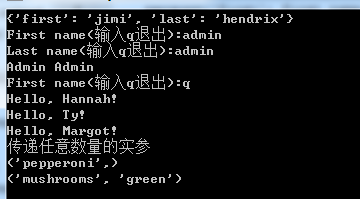
# -*- coding: utf-8 -*-
#Combining positional and any number of arguments
def make_pizza(size, *toppings):
print("Size:"+str(size))
for topping in toppings:
print(" - "+topping)
make_pizza(10, 'pepperoni')
make_pizza(20, 'mushrooms', 'green')
#With any number of keyword arguments, **user_info, ** indicates that a list of user_info needs to be passed
def build_profile(first, last, **user_info):
profile = {}
profile['first_name'] = first
profile['last_name'] = last
for key, value in user_info.items():
profile[key] = value
return profile
user_profile=build_profile('albert', 'einstein', loaction='princeton', field='physics')
print(user_profile)
Run result:

Import the entire module:
Import module, after importing, all functions in the imported file can be called, just like referencing something inside a file, first you need to create a new imported python file, which can contain some functions, such as make_pizza function inside:
# -*- coding: utf-8 -*-
#Combining positional and any number of arguments
def make_pizza(size, *toppings):
print("Size:"+str(size))
for topping in toppings:
print(" - "+topping)
You can import this Python file into another file, then you can call the function inside the python file (both files must be in the same directory)
# -*- coding: utf-8 -*- #Import entire module, hsDemo03 import file name import hsDemo03 hsDemo03.make_pizza(12, 'pepperoni')
Run result:
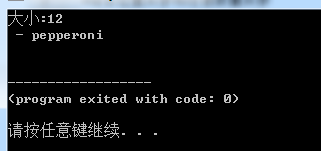
Import specific functions:
To import a specific function, only the functions you import can be used, as shown below
#Import a specific function, followed by several function names, separated by signs #from filename import function name 1, function name 2 #form filename import * represents all functions in the import module from hsDemo03 import make_pizza make_pizza(12, 'pepperoni')
as defines aliases:
Sometimes the import module or specific function file name is too long to use. You can take an alias to import when importing.
Format: Module or function name as alias
import hsDemo03 as hs hs.make_pizza(12, 'pepperoni')
from hsDemo03 import make_pizza as m m(12, 'pepperoni')